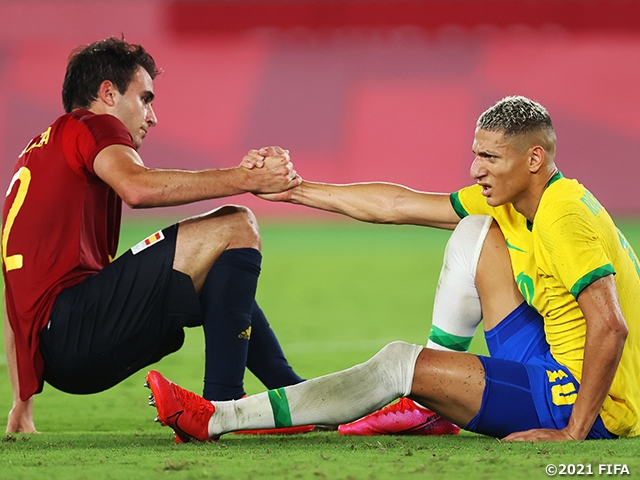NEWS
A sport culture that respects each other - Always have respect Vol.101
01 November 2021

At the Tokyo Olympic Games, five sports were held as official events for the first time, along with many other traditional events. One of them is Karate and it was held only in this Olympics as a traditional sport of Japan, the host country. The other four, 3X3 basketball, skateboarding, sport climbing, and surfing, are all popular sports among the younger generation and despite having their own world championships, they have generally been regarded as “leisure.”
It is said that the International Olympic Committee (IOC) added these events in hope of making the Olympics more attractive to the younger generation. At the next Paris 2024, in addition to these four sports, “breaking,” commonly known as “break dance,” in Japan will be added as an official event.
To be honest, I was a little sceptical about these sports, including freestyle skiing in the Winter Olympics, because I didn't think they really fit in. However, I have changed my mind completely after watching the competitions on TV.
The appearance of the athletes were very free and fashionable. However, the competition itself was very serious, and I felt that the athletes’ effort and ingenuity to gain techniques, strength, and speed were second to none.
What impressed me the most was that the athletes in these sports which are called “extreme sports” or “urban sports,” and strongly connected to youth culture and fashion, had a strong sense of “respect” for their rivals, and showed it by their actions.
In the “sport climbing” event, where each athlete took turns to tackle a given task and compete the level or speed of achievement, the competitors gathered before the competition to exchange opinions such as, “Put your right foot here, before putting your hand over there…” I was very surprised to see such scene, because in football, it was like the coaches of the opposing teams discussing strategies before the match, “What if you use this tactic?”
Above all, it was so impressive to see them praised each other's efforts after each competition and after the rankings were decided. While the gold medallists expressed their joy, their rivals would run up to them and congratulate each other.
Although I am not very familiar with these sports, I guess that these athletes compete in competitions all over the world on a daily basis and know each other very well. That may be why it is natural for them to congratulate their rivals and praise each other's efforts, whether they win or lose.
But what I felt even more strongly was the “culture” of these sports.
Mr. USHIKI Sokichiro, my “mentor” in football journalism, once mentioned that “Each sport has its own roots.” Just like how football has its own history and tradition, baseball has its own history and tradition as well, and it is wrong to criticise other sports based on the standard of one sport.
I found it very refreshing to know that the so-called “youth sports” that became official events in this Olympics have a wonderful culture where athletes respect each other and feel a strong sense of camaraderie while competing against each other. And I strongly felt that we need to continue to encourage such awareness and behaviour in football so that it can become part of our culture as well.
Football is the most popular sport in the world, and perhaps because of its widespread popularity, the “national style” of football has become so broad. I feel that rivalry and heroism have taken precedence over respect for each other, and such trend is becoming more and more apparent not only in the relationships between countries, but also between teams and between players.
I honestly believe that, if we can make the spirit of respect a “culture” in football, the most popular sport in the world, it can bring much more value to humanity than it does now.
Written by OSUMI Yoshiyuki (Football Journalist)
*This article was originally posted on the Japan Football Association Newsletter, “JFAnews,” September 2021 edition.
Japan Football Association Newsletter “JFAnews”
The Japan Football Association Newsletter “JFAnews” contains all the information on the Japan National Team, and all the events hosted by the JFA. Tournament results and team information throughout the nation are also available. The official monthly magazine is a must read for coaches, referees, and all members of the football family.
For information on the newest edition (Japanese website)
Related News
-
Respect
2021/09/29
Why we need to respect the referee’s decision - Always have respect Vol.100

-
Respect
2021/09/17
A clean match created by respect - Always have respect Vol.98

-
Respect
2021/09/15
Laws of the Game and Respect - Always have respect Vol.97

-
Respect
2021/07/21
Coach Moriyasu: Turning gratitude into power - Always have respect Vol.99

-
Respect
2021/06/22
Respect for VAR? - Always have respect Vol.96

Latest News
-
National Teams
2026/01/07
Japan Futsal National Team squad & schedule - AFC Futsal Asian Cup™ Indonesia 2026 (1/15-2/8@Jakarta, Indonesia)

-
National Teams
2025/12/28
U-23 Japan National Team squad & schedule - AFC U23 Asian Cup Saudi Arabia 2026™ (12/30-1/26@Jeddah, Saudi Arabia)

-
National Teams
2025/12/15
Japan Beach Soccer National Team squad & schedule - Training Camp (12/17-20@Okinawa)

-
National Teams
2025/12/15
U-22 Japan National Team squad & schedule - IBARAKI Next Generation Cup 2025 (12/21-27@K's denki Stadium Mito, Ibaraki)

-
National Teams
2025/12/12
U-18 Japan National Team squad & schedule - SBS CUP INTERNATIONAL Youth Soccer 2025 (12/15-21@Shizuoka)


